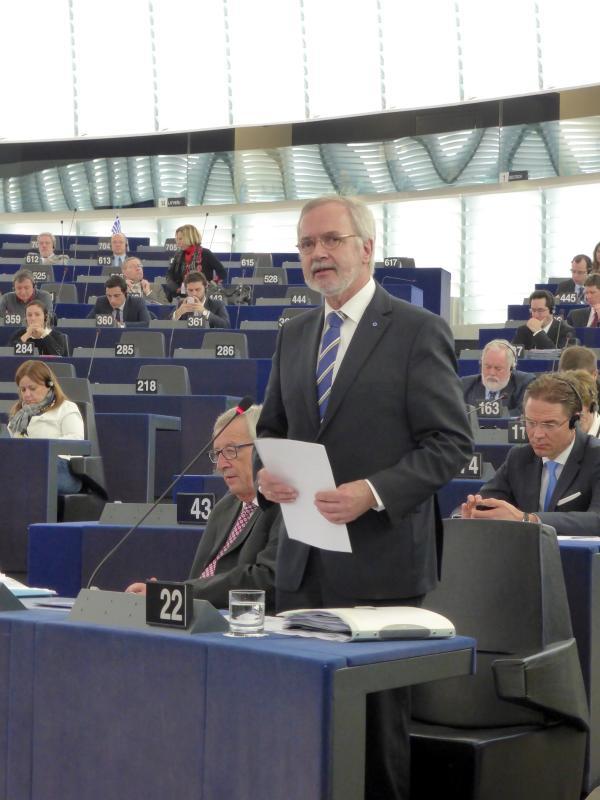
President Hoyer addressing European Parliament on Investment Plan for Europe
Since 2007 Europe has made enormous efforts to overcome the financial and economic crisis. It has improved economic governance, introduced efficient financial backstops, and set up a banking union. Member States are consolidating public finances and undertaking structural reforms. Yet, despite the progress, the European economy is still fragile; investment is 15% lower than in 2007, and unemployment up 40% in the last seven years.
Lack of investment is not due to a lack of capital. Europe has ample liquidity, which is available both in financial institutions and in corporations, but this money is not reaching the real economy. Worn by a long period of crisis and worried about regulatory and economic uncertainty, investors shy away from risk. Our challenge is to help address this market failure in risk-bearing capacity in Europe. We must bridge the gap and enable project promoters to attract private finance. We need to extend the investment capacity of the EIB Group and others. This is the goal behind the launch by the European Commission of an Investment Plan for Europe and the proposal for a new “European Fund for Strategic Investments (EFSI)” as part of the EIB. I shall propose to the EIB’s governing bodies that they endorse our participation in this plan.
The fund will be initially endowed with EUR 21bn for targeted, catalytic risk bearing capacity. This money will allow us to become involved in riskier, but potentially highly beneficial ventures. As a result, high added value projects will attract private investment. In total, the new fund should mobilise an additional investment of at least EUR 315bn. The pipeline of projects for the fund will build upon work done by a Task Force of Member States under the chairmanship of the EC and the EIB. Subject to the approval of our Board, the new structure will have a dedicated governance, ensuring that its activities focus on its distinctive mission.
The EIB will coordinate and pull together a new single hub for all European investment advisory services, ensuring projects can achieve the highest possible quality standards and maximise their chance of access to finance.
Another essential pillar of the Juncker Plan is the need to ensure that the EU and the Member States remove existing regulatory and administrative barriers to investment at both European and national level. Structural reforms also remain critical to enhancing Europe’s competitiveness.
The EIB has a pivotal role to play in Europe’s recovery and growth. In recent years it demonstrated it is capable of contributing to a firm response to the economic crisis. We promised to use the EUR 10bn paid-in capital increase granted in 2013 to mobilise investment across Europe, and we are on track to ensure that the total additional investment generated by that increase will be in the order of EUR 180bn for the period 2013-2015 – and possibly even exceed that target. The Bank has a strong track record of putting money to work. That is why we are central to the success of investment initiatives such as the Commission’s investment plan. We are committed to ensuring that our know-how and experience, in partnership with the Commission, help provide fresh stimulus for the real economy in Europe.
Werner Hoyer
EIB President

Photographer: EIB ©European Union
Download original

Photographer: EIB ©European Union
Download original

Photographer: EIB ©European Union
Download original

Photographer: EIB ©European Union
Download original

Photographer: EIB ©European Union
Download original